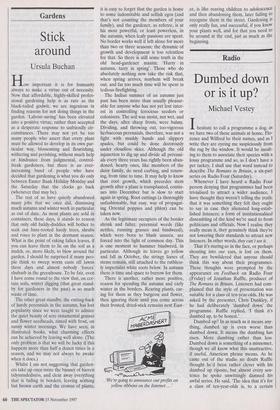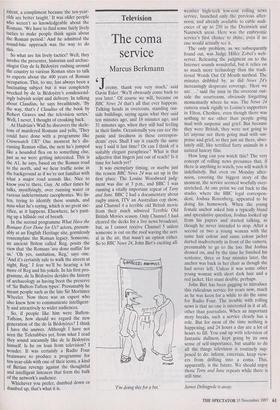Radio
Dumbed down or is it up?
Michael Vestey
Ihesitate to call a programme a dog, as we have two of these animals at home. Flo- rence and Wilfred be their names, and as I write they are eyeing me suspiciously from the rug by the window. It would be insult- ing to them to associate their species with a lousy programme and so, as I don't have a pet turkey, I shall use that word instead to describe The Romans in Britain, a six-part series on Radio Four (Saturday).
Whenever I have heard a Radio Four person denying that programmes had been trivialised to attract a wider audience, I have thought they weren't telling the truth; that it was something they felt they ought to say in case they alienated long-estab- lished listeners; a form of institutionalised dissembling of the kind we're used to from politicians and officials. Now I realise they really mean it, they genuinely think they're not lowering their standards to attract new listeners. In other words, they can't see it.
That it's staring us in the face, or perhaps shouting into our ears, is lost on them. They are bewildered that anyone should think this way about their programmes. These thoughts were prompted by the appearance on Feedback on Radio Four (Friday) of Jonathan Ruffle, producer of The Romans in Britain. Listeners had com- plained that the style of presentation was suitable for a class of ten-year-olds. He was asked by the presenter, Chris Dunkley, if he had deliberately 'dumbed down' the programme. Ruffle replied, 'I think it's dumbed up, to be honest.'
Dumbed up? In as much as it means any- thing, dumbed up is even worse than dumbed down. It means the dumbing has risen. More dumbing rather than less. Dumbed down is something of a misnomer, though we all know what this unattractive, if useful, American phrase means. As he came out of the studio no doubt Ruffle thought he'd been rather clever with his dumbed up riposte, but almost every sen- tence he spoke unwittingly damned his awful series. He said, 'The idea that it's for a class of ten-year-olds is, to a certain extent, a compliment because the ten-year- olds are better taught.' It was older people who weren't so knowledgeable about the Romans. 'We have to find some fairly lively tactics to make people think again about the Roman period.' And he admitted the sound-bite approach was the way to do this.
So what are his lively tactics? Well, they involve the presenter, historian and archae- ologist Guy de la Bedoyere rushing around the country to various Roman sites to talk to experts about the 400 years of Roman occupation. This, to me, has always been a fascinating subject but it was completely wrecked by de la Bedoyere's condescend- ingly babyish script and delivery. In talking about Claudius, he says breathlessly, 'By the way, that's I Claudius of the book by Robert Graves and the television series.' Well, I never, I thought of croaking back.
At Hadrian's Wall he discovers the skele- tons of murdered Romans and yells, 'They could have done with a programme like Crimewatch UK!' One moment he's dis- cussing Roman villas, the next he's jumped like a hounded flea on to something else, just as we were getting interested. This is the Al, he says, based on the Roman road to the north, and we hear traffic noise in the background as if we're not familiar with what a major road sounds like. Nice to know you're there, Guy. At other times he talks, mystifyingly, over running water or various indeterminate cacophonies. We lis- ten, trying to identify these sounds, and miss what he's saying, which is no great sac- rifice, as it happens. Elsewhere, he's pant- ing up a hillside out of breath.
In the second programme What Have the Romans Ever Done for Us? actors, presum- ably at an English Heritage site, gormlessly contemplate the Roman legacy. Someone, an ancient Briton called Reg, posits the view that 'the Romans 'aye done nuffin' for us.' Oh yes, sanitation, Reg,' says one. `And it's certainly safe to walk the streets at night, Reg.' I fear we'll be hearing a lot more of Reg and his yokels. In his first pro- gramme, de la Bedoyere derides the history of archaeology as having been the preserve of 'Sir Bufton-Tufton types'. Presumably he meant people such as the late Sir Mortimer Wheeler. Now there was an expert who also knew how to communicate intelligent- ly and attractively to wider audiences.
So, if people like him were Bufton- Tuftons, how should we regard the new generation of the de la Bedoyeres? I think I have the answer. Although I have not seen the Teletubbies yet, from what I read they sound uncannily like de la Bedoyere himself. Is he on loan from television? I wonder. It was certainly a Radio Four brainwave to produce a programme for ten-year-olds with one of their icons, a kind of Birtian revenge against the thoughtful and intelligent listeners that form the bulk of the network's audience.
Whichever you prefer, dumbed down or dumbed up, that's what it is.











































































 Previous page
Previous page